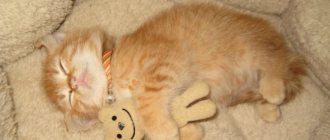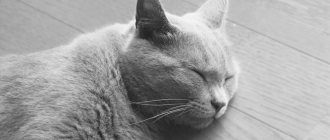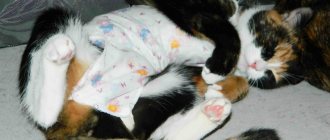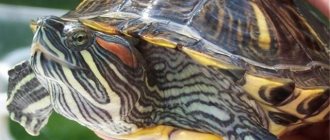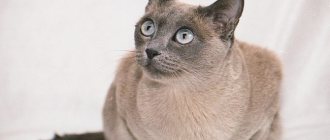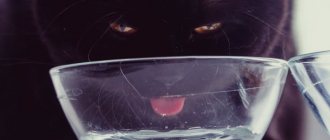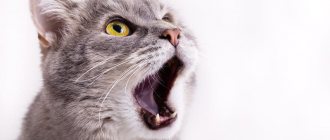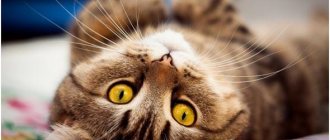Our beloved cats are the most important couch potatoes. Their activity time is much shorter than their resting state. Because of this feature, owners often worry, wondering why their cats sleep so much. Despite the suspiciously high duration, in most cases, cat naps are explained by completely harmless reasons.
Why does the cat sleep all day?
Cat owners note that their pets spend a lot of time dozing or sleeping, nestled in a cozy place.
Games and fun often tire them and sleep helps them replenish their strength. But many people worry why cats sleep all the time, considering this behavior to be a deviation from the norm. Most often, there is no reason to worry, since cats are naturally sleepy. A short period of vigor is replaced by deep sleep or a long nap. This is not a malaise at all, as it might seem at first glance, if the cat’s overall appearance is healthy. Alarm bells that accompany drowsiness may include :
- lethargic behavior during the waking period, when favorite games become a burden, apathy, lack of mood and sparkle in the eyes,
- refusal to eat and drink, even your favorite treats,
- dry nose, pale skin, increased body temperature.
These symptoms indicate that your pet is sick and should definitely be seen by a doctor.
Kingdom of Cat Dreams
Healthy, full sleep is no less important for a cat than for a person. This is the basis of her normal psycho-emotional and physical state. Show your pet not only curiosity, but also caring attention - perhaps she needs your help?
In sleep, cats restore energy and emotional state
The meaning of sleep positions
The position in which your cat prefers to sleep has its own meaning:
- on the stomach or on the side - the most common and natural position of a cat’s relaxed body during sleep; the animal is calm and does not experience any problems;
- on the back - a position of special trust; kittens sleep this way more often than adult animals; A cat is only capable of opening its defenseless tummy if it is absolutely sure of its safety;
- curled up - this position indicates that the cat needs some kind of protection; perhaps she is just cold, then she can also hide the tip of her nose in the fur;
- huddled in a secluded place - most likely, your cat is experiencing a certain uncertainty or feeling of discomfort; take a closer look to see if everything is fine with her;
- unusual or unnatural positions that your sleeping pet manages to assume most often indicate the special creativity of his feline personality and satisfaction with life.
Photo gallery: where and how cats sleep
All cats love to sleep with their owner
Sleeping on your stomach is the most natural
The side position is one of the most common for cats to sleep.
Cats sleep curled up in a ball if they need protection.
Sometimes cats choose places to sleep that are unexpected by our standards.
Cats really like positions that are unnatural in our opinion.
Cats sleep together to keep warm
Overtired cats can fall asleep in any position.
If a cat covers its nose with its paw in a dream, it means that it is cold
Kittens sleep with their mother almost all day
Kittens mostly sleep on their backs
Sleep disorders
While in the REM sleep phase, the animal is so deeply immersed in the abyss of dreams and its own experiences that from the outside it can look creepy. Don’t rush to get scared - you, too, don’t always control yourself in a dream.
During REM sleep, a cat may roll its eyes and stick out its tongue.
If you are still concerned about the way your pet sleeps, try to wake him up - although in the REM phase this may not be an easy task. Calm the animal and let it fall asleep again. There is no reason to worry, these are the characteristics of a cat's sleep.
Disturbances in the pet's normal sleep should be of greater concern. Excessively increased sleepiness or chronic lack of sleep is evidence that the animal is sick or is under stress. The consequences of this serious malfunction appear during periods when the cat is awake:
- the animal becomes irritable or, conversely, apathetic;
- appetite destabilizes - the cat begins to eat either too much or refuses food;
- the cat drinks too often and too much;
- The pet's behavior changes dramatically.
Pay attention to how your cat sleeps
An attentive owner will be able to notice these manifestations even before the symptoms of a specific disease make themselves known, and consult a doctor in time, which is very important for the successful treatment of any ailment.
Video: cat sleeps with mouth open
What dreams do cats have?
Cats dream - this is a scientifically proven fact. What do our favorite purrs dream about? French neurophysiologists from the University of Lyon were looking for an answer to this question. Their findings authoritatively confirmed what one could have simply guessed: in their dreams, cats live some kind of parallel lives that differ little from reality.
In dreams, cats live parallel lives
They hunt and simply eat, chase prey and run away from pursuit, fight with enemies and caress their cubs. According to scientists, there are still more positive things in cat dreams than unpleasant moments. But here’s what’s curious: neither cats nor cats ever dream of erotic scenes. Scientists have not yet found an explanation for this.
Video: funny sleeping cats
Sleep Features
Cats spend almost two-thirds of the day sleeping, but any deviation in the direction of a significant decrease or increase in hours of sleep should force the owner to take a closer look at the pet. Little kittens can generally sleep almost all the time, interrupting only for food and a short exploration of the world around them. Adults become more active, mobile and spend periods of wakefulness longer and more interesting.
Several factors can influence sleep duration:
- seasonality and weather conditions, in hot weather cats become sleepier,
- age, small kittens and older individuals sleep more,
- how full the pet is, the feeling of satiety always makes you sleepy,
- the atmosphere of the house, the calmer and more comfortable, the more serene the pet rests,
- activity and health.
It is worth noting that overfed cats can sleep more than normal and be less active and mobile than their “slender” counterparts.
Cats cannot sleep continuously. He goes through phases, the first of which is dozing. At this time, processes slow down, but the cat can return from dormancy to wakefulness instantly. If nothing interferes, he falls into a deep sleep. And then complete relaxation sets in, during which it is quite difficult to wake up the pet.
These two phases constantly alternate. At the same time, you still need to leave time for games, entertainment and, of course, delicious food.
Cat sleep: how long does it last?
The duration of sleep depends on many factors. This includes age, room temperature, sense of security, activity, and weight of the pet. Cats sleep for long periods of time, spending more than half their lives simply snoring, but unlike humans, cat sleep is rarely deep.
How does a cat sleep? For many, this still remains a mystery, but research allows us to lift the veil of secrecy. An animal's sleep can be divided into several cycles and phases:
- Preparation - choose a warm place, preferably elevated above the floor, soft and comfortable. The cat stomps to check whether it is safe to lie here, and also to create a depression. He stretches, relaxes and lays down;
- Napping - the cat sleeps calmly, does not make sounds, most often lies in a ball or on its stomach. Breathing slows down at this time, the heart beats slower, but the pet is very sensitive. If you touch him, he will wake up immediately. This phase lasts no more than half an hour;
- Deep sleep - occurs after a nap if the cat is not bothered by anything. Muscle tone is completely absent, the eyelids begin to twitch, convulsions, cramps, twitching of the paws and whiskers may appear. Your pet dreams: hunting, attacks, treats, which leads to growling, turning from side to side, meowing. NREM sleep lasts about 20 minutes, and then it is replaced by drowsiness again;
- Waking – Depending on why the cat woke up, its awakening will vary. So, if the pet is awakened by appetizing smells or a slight feeling of hunger, the cat will be lethargic, stretch, and close its eyes. If the reason lies in sharp sounds and a sense of danger, the animal will quickly emerge even from the stage of deep sleep.
Seals rest a lot, their sleep is over 16 hours a day. Babies and older pets sleep the longest: young and active animals have much more worries and hobbies. During sleep, babies have to gain strength and grow better, so kittens rapidly gain weight and grow up very quickly.
However, even at home, the cat does not cease to be a predator and hunter. He sleeps extremely carefully, constantly wakes up, and as soon as you open the refrigerator or unwrap the rustling wrapper, his little ears will rise, and the pet will restlessly inspect the territory.
Kittens sleep
Cat babies are born blind and deaf. Eating and sleeping under mother’s warm belly are the only events and joys of their life. But in these little ones, the fast phase predominates and accounts for up to 70 percent - to put it simply, they dream, and sleeping kittens experience a lot of emotions.
Even newborn kittens dream.
Even just yesterday, kittens that were born are happy about something and are afraid of something in their dreams - they twitch their paws, squeak, even hiss, opening their toothless mouths.
Newborn kittens sleep almost 24 hours a day and are only awake when they eat. This is completely normal, because all children grow well in their sleep. But the kids have already grown up, and the world of their interests is expanding every day further and further beyond the “nest” in which they were born. Kittens play a lot and actively, receiving a lot of impressions every minute, and proper rest is vital for them.
All cats love to sleep with their owners - even the smallest ones.
In a dream, a kitten not only regains its strength, its brain works tirelessly - systematizes and analyzes the information received, puts all recent events “on the shelves.” As the baby grows up, it gradually enters an adult sleep pattern and by four to five months sleeps as much as its mother.
Long sleep and its causes
There are several reasons for prolonged sleep. If they are not associated with general lethargy and refusal to eat, then they are considered normal.
Cats are naturally very active. It is vital for them to replenish their strength and sleep is the best medicine for this.
Again, returning to natural premises, it should be noted that in nature, cats are predators. Their main diet consists of food rich in proteins. Pets also eat mainly protein foods, which require a long time to digest.
After sterilization, your cat may sleep longer than usual.
Possible diseases and their symptoms
Long sleep can also indicate illnesses of your beloved pet. You should conduct a thorough examination and observe the cat for some time. For what? To understand whether this is serious or everything is normal. The following symptoms may indicate the presence of pathologies.
- Vomiting and diarrhea.
- Decreased appetite.
- Dry and hot nose.
- Inflammation of the eyes or mouth.
- Labored breathing.
- The presence of mucus or blood in the discharge.
- Hair loss or itching.
- Refusal of water or thirst.
- Weight. Those pets who are overweight have difficulty moving around and leading an active lifestyle. That's why they sleep and eat more. But if you leave it just like that, the animal may develop other diseases against the background of obesity. We must fight excess weight.
The presence of infections or allergies, as well as diseases of the cardiovascular, digestive and excretory systems, forces the cat to spend more time sleeping. Various stresses and unfavorable surroundings can provoke these diseases.
As soon as you notice that your cat has restless sleep, is apathetic, and has lost his appetite, you should be wary. Having determined the exact symptoms, you should take your pet to the doctor to identify the source of the disease and what influenced the environment of such sleep.
The cat will definitely show you that he feels bad. In any case, you will notice this by his behavior.
Long sleep: normal or pathological?
In general, only a veterinarian can make conclusions about a pet’s health. Perhaps the cat is sick, and sleep is a consequence of malaise, weakness and loss of strength.
A kitten, a small cat sleeps all the time and this is normal. Her sleep may be interrupted by short games and food. At the same time, during rest, he can twitch his paws and squeak quietly. Don't worry, these are signs of emotionality experienced during the day's events.
Experts believe that the number of hours a pet naps and sleeps is greatly influenced by weather conditions . Since thermoregulation is important for animals, in the summer, especially on hot days, the rest period may increase and it will seem that the cat is sleeping all day.
A combination of drowsiness and lack of appetite should alert you. Then you definitely need to take your pet to the vet.
In general, long-term sleep is normal for cats, as long as there are no obvious behavioral abnormalities or problems with appetite or bowel movements during wakefulness.
What dreams do cats have?
Cats dream - this is a scientifically proven fact. What do our favorite purrs dream about? French neurophysiologists from the University of Lyon were looking for an answer to this question. Their findings authoritatively confirmed what one could have simply guessed: in their dreams, cats live some kind of parallel lives that differ little from reality.
In dreams, cats live parallel lives.
They hunt and simply eat, chase prey and run away from pursuit, fight with enemies and caress their cubs. According to scientists, there are still more positive things in cat dreams than unpleasant moments. But here’s what’s curious: neither cats nor cats ever dream of erotic scenes. Scientists have not yet found an explanation for this.
Signs of the disease
An attentive owner will always notice that something is happening to the cat. Lethargy is always a sign of illness, as are the following symptoms :
- the appetite is absent or significantly reduced, the pet may even refuse its favorite treats,
- the nose became dry and hot,
- the cat sleeps all day, apathy has appeared,
- refusal of water,
- increased body temperature,
- there is diarrhea and vomiting,
- the fur has acquired a dull tint, the mucous membranes have turned pale.
Any of these symptoms is a reason to consult a medical specialist. The presence of two or more signs at the same time can be a sign of an acute or chronic disease.
The main reasons why a cat has become lethargic and always sleeps can be diseases such as worms, ticks, poisoning, problems with the intestines or genitourinary tract, as well as injuries of various types. And the sooner the disease is identified, the faster and easier it is to defeat it.
Long sleep as a sign of illness
If you are concerned about why your cat is constantly sleeping, since this has not been observed before, this is a good reason to contact a veterinarian, who, after examining the animal, will be able to identify a developing pathology. An increased duration of sleep indicates a disease in a cat if it is accompanied by other symptoms:
- increased body temperature;
- lethargy and apathy;
- nausea and vomiting;
- hoarse breathing and runny nose;
- matted wool;
- causeless meowing and aggression.
The above symptoms observed in a domestic cat or cat may indicate food poisoning, surges in blood pressure, viral and bacterial infections, helminthiasis, hypovitaminosis, the appearance of fleas and other parasites. We cannot discount anemia, which can develop due to poor nutrition or internal bleeding, endocrine disorders, diseases of the musculoskeletal system, and even oncology. A veterinarian will be able to make an accurate diagnosis after receiving test results and examination.
After sterilization
It should be noted that after sterilization surgery, the cat does not eat and sleeps all the time; this is a normal state after anesthesia. If this period lasts for 24 hours, then there is nothing to worry about. If a day has passed and the condition does not change, you need to urgently see a veterinarian.
During the first 24 hours, you don’t need to force the cat to get up or wake him up if she doesn’t want to. Just like insisting on food and drink. Give her a little rest, recover, and she will again delight you with her cheerful appearance.
If the anesthesia has not worn off and the cat is not sleeping, gets up and tries to move around the apartment, do not let it out of sight so that it does not accidentally get injured. It’s better to take her in your arms, calm her down, and maybe she’ll fall asleep. Sleep is the best medicine here.
Cat depression
If excessive sleeping is accompanied by other signs such as loss of appetite, avoidance, and other unusual behavior, it may mean your cat is suffering from depression. However, feline depression is not the same as clinical depression in humans. This condition may present with symptoms similar to those mentioned as a result of an underlying medical condition. In such cases, it is best to take your cat to a veterinarian, who will perform the necessary tests to determine what is wrong with your cat.
Why does a cat sleep a lot?
Cat owners are well aware that their pets are big sleepers. At any moment you can find them dozing peacefully in a variety of places. Scientists have calculated that the average cat is quite capable of sleeping up to 22 hours a day. But sleep is not always a sign of calm and well-being. In some situations, excessive sleepiness may indicate illness, or be a sign of an imbalance in the animal's body.
Differences in sleep depending on breed
Breed characteristics, character and temperament are also reflected in cat dreams. Of course, homeless “noblewomen”, forced to earn their own food, would also not mind sleeping all day - but who will give it to them? Such animals have to stay awake for at least five hours a day.
Another thing is well-fed domestic lazy people, not even necessarily very thoroughbred. “Indoor” pets, especially if they are sterilized, are able to sleep almost the entire day - up to 22 hours a day! Of course, every cat is a bright individual, but different breeds also have different attitudes towards sleep:
- The leaders in the Dormouse ranking are the imposing, handsome Persians - ambitious and narcissistic cats are very lazy and phlegmatic in everyday life;
Persian cats are big fans of taking a nap at their owner's feet.
- Many British, Burmese and American shorthair cats are distinguished by sanguine balance - they sleep “according to circumstances” and in moderation;
- Representatives of such aggressive and even dangerous breeds as jungle and Siamese cats cannot afford to sleep for too long - almost all the time they are tense and ready to attack, and relax only for a short time;
- and the cute bald ones stand out completely apart: hairless sphinxes, Devon Rex, Ukrainian Levkoy and other devoted and affectionate cats constantly need warmth and care - they are ready to sleep as much as they want, but only next to their beloved owner; the rest of the time, animals can show unusual activity, and when carried away, completely forget about sleep.
Hairless cats are actively awake and sleep soundly.
The origin of the cat's long sleep
Cats are originally nocturnal animals. This is how their distant ancestors were, and this is how modern mustachios-striped animals remain. This quality is especially familiar to residents of rural areas, private houses and summer cottages. Cats living in complete or partial freedom come home only to eat and sleep, preferring to travel or hunt at night.
Domestic cats, who live indoors all their lives, rarely roam around the apartment at night, so they sleep much more than their more free-spirited counterparts. For those, significant daytime sleep is simply necessary, as the body needs to recover and digest the prey. How do domestic fluffies sleep so much and maintain the flexibility of the spine and joints, muscle elasticity with almost complete absence of physical activity - a mystery that has not yet been solved by scientists
Energy storage
It's funny, but true: why cats sleep so much, scientists still haven't fully understood. There is a version that this is in some way connected with their hunting instincts and twilight lifestyle. In the wild, felines usually go hunting after dark.
And they sleep during the day to accumulate energy for night chases. Domestic cats have retained these ancient instincts to some extent - and diligently sleep during the day in order to gain strength for catching prey. But since, regardless of the time of day, there is no one to catch in our apartments, then at night the cats... also sleep - just in case.
Normal sleep duration for an animal
Like human offspring, kittens sleep almost all the time, interrupting only to feed. This is completely normal, because their body is still very weak. In their sleep they grow and become stronger. A slightly older cub sleeps less, but still at least half a day.
An adult cat sleeps about the same amount or a little less/more. It is impossible to give an exact figure, because all animals have a pronounced individuality. Much depends on the character. Some cats are energetic, active, they play a lot and have fun. Others are inert, lethargic, prone to weight gain and much less active than their vigorous counterparts. Most of the time they just sleep.
There is a popular expression: “sleeps like a cat with half an eye.” This is a very apt remark. Unlike humans, who must sleep at least 7-8 hours in a row to restore energy, cats sleep in “short intervals.” On average, they simply doze for most of the time without losing their alertness. As soon as the slightest rustle is heard, the cats immediately wake up.
All sleep in cats is divided into two phases:
- Nap, superficial “slow” sleep – 20-30 minutes.
- Deep, “fast” sleep – 5-7 minutes. At this time, animals, like people, dream. Cat owners are well aware of this, since a sleeping pet can twitch its paws in its sleep, “run” and even meow. All this clearly indicates the presence of dreams.
The duration of sleep can be influenced by various external factors, for example, extreme fatigue, stress, changes in temperature. Physiology also influences the duration of rest. Pregnant cats sleep much more - this is a need for the body experiencing increased stress.
Sleep phases
The sleep of mustachioed pets consists of two constantly alternating phases: slow and fast. During the first phase, the animal dozes. Despite the slowdown in heart rate, breathing and metabolic processes, his muscles remain tense and his brain remains active. This maintains the sensitive response to external stimuli necessary for survival.
A curled up cat quickly and easily wakes up if disturbed by its owner or a loud sound. The slow phase lasts no more than 30 minutes.
In the absence of stimuli, the first phase flows into the second. At this stage, the body is completely relaxed, so you can see twitching of the paws, eyelids and whiskers. The duration of the fast phase is no more than 7 minutes.
For homeless animals it is shorter, since it is very difficult to wake up at this time. Losing control over what is happening can result in death. Pets do not have this problem - the safer he feels, the longer his fast phase.
Natural causes of prolonged sleep in cats
A healthy cat can sleep more in the following cases:
- Extreme fatigue. After a night hunt, active play or prolonged wakefulness, the animal needs to restore strength and expended energy, so it sleeps much more than usual.
- Hot weather. At high temperatures, you have to save energy and water reserves in the body. This is well known to animals native to arid and hot places. The ancestors of cats originally lived in deserts, so they were excellent at maintaining strength in the heat and high dry air. They slept during the day and were more active at night, when there is no sun and the temperature drops significantly. Modern cats use genetic memory and prefer to take a nap during the midday hours, so during the hot season they sleep more than usual.
- Cold winter, rain, snow or low indoor temperature. In this case, purrs also sleep a lot, saving heat and trying to expend less energy. Curling up into a tight ball while sleeping makes it easier to maintain temperature balance in the body tissues. This method allows you to survive the cold and not freeze.
- Pregnancy. During gestation, the cat has to live for three, or even seven or eight. This is a burden on the body, and a natural way to maintain strength is long sleep.
- Use of a number of medications with sedative properties. They affect the nervous system and cause some inhibition, which leads to an increase in sleep duration. Drowsiness goes away on its own as soon as the drug's effect wears off.
- Previous surgery. After surgery and anesthesia, the animal sleeps a lot for two reasons: pain due to the operation and the effects of the anesthetic drug. As you recover, the duration of sleep will decrease to the usual norm.
- Vaccination completed. Vaccinations cause a response in the body that is somewhat similar to a disease. The animal feels weak and lethargic, so it sleeps a lot to recover.
- Castration or sterilization. This is not only severe stress, but also hormonal changes in the cat’s body. While the transition is underway, your pet may be sleepy and lethargic.
- Elderly age. The older the cat, the longer his sleep lasts. This is due to the aging of all organs and tissues, lack of energy and reluctance to move a lot, as in youth. The cause of increased sleep duration may also be various sluggish chronic diseases that weaken the pet.
- Recovery after illness. This is an energy-consuming and difficult period for the cat, so he rests and naps a lot.
- Stress. The reaction to it is first excitation of the nervous system, and then severe depression.
How to change your sleep mode
In order for your pet to spend the night in bed with you, you need:
- Play with your pet in the evening, but not just before bedtime. So that before you go to bed, your pet has little energy left, and he restores it with you.
- Feed the animal closer to night. After all, as is already known, cats after eating run to bed to digest it.
- Do not respond to your pet's early cries for food. He should instill the habit of eating only after the owner gets out of bed. Maintain feeding intervals and routines. It is better to feed your cat at the same time.
- Be sure to close the windows with thick curtains. So, the morning sun's rays will not allow the cat to get up before the alarm clock.
Over time, with some effort, the cat will get used to this order of affairs and will stop causing mayhem at night.
If your pet sleeps a lot, then there are very few reasons to run to the doctor. Sleeping a lot is an adequate state for cats and they spend most of their lives sleeping. Be active with your pet and if you notice any symptoms, consult a doctor.
By the way, cats love to sleep with people - this is how they express love, warm themselves and place themselves in a safe space next to you.
Pathological causes of too much sleep
If a cat is sleeping unusually much and is showing some concerning signs, owners should contact their veterinarians. This may indicate an underlying disease.
Attention should be paid to the following additional symptoms:
- fever, fever;
- the animal tries to hide, chooses a dark corner and a hard-to-reach place;
- lack of appetite;
- refusal of water;
- complete ignoring of a favorite treat or toy;
- nausea, vomiting;
- digestive disorders;
- heavy, hoarse breathing, runny nose;
- festering eyes;
- blanching of tissues in the mouth cavity;
- trembling, shaky, uncertain gait;
- meowing, including in sleep;
- acute reaction to touch, even aggression;
- matted, unkempt fur.
These symptoms indicate that sleep is not an increase in rest, but an indicator of serious health problems. The pet must be taken to the veterinarian urgently, because the cause can be either an easily treatable disease or an extremely life-threatening pathology.
How to help your pet
If you notice that your pet is sleeping more than usual, but is still active and interested in life, read my article on how cats sleep. In it, I explain sleep biorhythms in detail, and this will help you figure out whether your pet really needs your help.
Loud noises and small children can be a source of stress. As soon as the source of irritation disappears, the animal needs to sleep. Therefore, try to protect your pet from stress and see if his condition changes.
Review your cat's diet: check the balance of the food and the serving size. Obesity should not be considered funny, it leads to serious illnesses and affects the amount of time spent in a passive position - it becomes very uncomfortable to move.
Contact your veterinarian if you cannot establish a routine on your own or if your pet’s health condition worsens.
What affects how long a cat sleeps?
At first glance, it seems that cats are fast asleep, but in fact they wake up from any rustle. The duration of sleep remains the same as it was in cat ancestors. Wild predatory cats rested after a successful hunt, while the body digested food. Modern breeds live about the same way.
Cat sleep includes 2 phases:
- light nap (dream time is half an hour);
- quick deep sleep.
During a nap, the animal lies on its stomach, tucks its paws, ears up or in a ball position. This state is practically no different from the waking state, but less energy is spent. During the period of dozing, breathing slows down, blood circulation and body temperature decrease. But as soon as the animal senses danger, it will immediately jump up, replacing dormancy with an active state. During deep sleep, they relax, rest, and the immune system actively works.
Why do cats sleep so much?
When cats sleep, they move their ears, paws, and meow - this means that they are dreaming. Mustaches have their own biological clocks that work in accordance with time, climate, environment, and health status.
Satiety
If you watch your pet, you will notice that after a hearty lunch or dinner, he goes to bed. After eating, cats need rest. At rest, food is digested and the animal gains new strength. When the diet contains more protein and meat, the animal sleeps for a long time, peacefully. With insufficient calorie food, the pet has to wake up and eat more often. The kitten sleeps a lot, this is normal, because they wake up only to drink their mother’s milk.
Fatigue
Animals expend a lot of energy during the day. Games and hunting require a lot of energy and stamina. Tired of running around, the cat needs to stock up on energy, so he falls asleep. An older pet gets more tired.
Age
Does the kitten sleep all the time? - That's how it should be. Sleep at their age is 22-23 hours. They wake up to eat. At 1 month, kittens begin to be active, play, and explore the world around them. Sleep is reduced and ranges from 21 to 22 hours. Over time, rest hours decrease. One-year-old cats are more awake and have less time to sleep. On average, pets sleep from 14 to 20 hours, the duration varies from person to person. After 8 years, changes occur, the duration of sleep increases. If the pet is no longer small, then it still sleeps more than 20 hours a day, do not panic.
Breed
The duration of sleep also depends on the breed. How different cat breeds sleep:
- Scottish and British cats are able to fall asleep after eating;
- Abyssinians are an active breed and their representatives love to play with their owner. Everything is determined by the characteristics of temperament. Most of the time they are active;
- Egyptian Mau, Bengal cats are active and sleep 14 hours a day;
- Persian cats are lazy, lethargic, phlegmatic. Most of the time they are drowsy, often dozing;
- Siamese cats are constantly tense and relax for a short time;
- Sphynxes, Devon Rexes - need attention, care and are ready to sleep all day long.
Is it possible to synchronize cat and human mode?
Cats are guided by instincts, so even if the cat is at home, hunting has not been canceled. And especially at night. That's why many owners complain about their pets that they don't let them sleep. But this state of affairs can still be corrected. Cats understand everything pretty quickly. But in fact, it seems as if they did not hear the order to go to bed at all. And other individuals may begin to take revenge for the fact that they are not allowed to hunt at night. You won’t be able to talk to a cat much like you would a person, but you can try to instill in it new everyday habits. Not every cat will appreciate such a turning point, but it will definitely be able to adapt. The main thing is to follow the rules and never miss the schedule.
Agreeing is not a problem. Maybe the cat can hear you!
Causes of long sleep
Why do cats sleep a lot? This question is asked by many pet owners. Every cat needs healthy sleep. The duration of sleep can be influenced by many reasons.
After sterilization
If a cat sleeps a lot after sterilization, this is a normal reaction of the body to anesthesia and surgery. The pet can be in a sleepy state for 10 days. If drowsiness persists for more than two weeks, this is a reason to contact a specialist; there may be serious postoperative consequences. Many individuals sleep for 12 hours after anesthesia and are already beginning to be awake. For this reason, after castration, cats sleep so much, waking up for 2-3 hours to drink and eat.
Important! Any operation is a great stress for the body, so long sleep is a restorative function.
Cat after sterilization
Cat activity
The duration of sleep also depends on the activity of the pet. If you play with a cat for a long time, then after playing it will immediately go to sleep to restore energy. You may notice that many cats sleep during the day and are active at night. The kitten constantly sleeps after long games or walks. They, like older individuals, become very tired and require restoration of energy reserves.
And others
The cat sleeps a lot, lethargy is constantly observed, loss of interest, refusal to eat are alarming signs. It may indicate a serious illness in your pet. Lethargy, excessive drowsiness, nervous excitability, signs of malfunction of the thyroid gland. The pet must be shown to a veterinarian. If a cat snores and cannot find a comfortable position, this means there are problems with the respiratory system.
Why do cats sleep a lot in winter and in cloudy, rainy weather? In cold weather, metabolism slows down and cats sleep longer. Before the onset of cold weather, the pet’s body builds up its fat layer in preparation for the cold, and the metabolism slows down. As daylight hours decrease, they become lazy and calm, sleep and eat more. In the summer, on hot days, cats love to soak up the sun and sleep. After sleeping during the day, cats become active at night.
Important! Why do pregnant cats sleep so much? Because carrying a fetus takes a lot of energy, activity decreases, and frequent rest is needed.
Pregnant cat sleep
Obesity/vitamin deficiency
Obesity is a very likely reason why your cat sleeps a lot. In addition to overfeeding, obesity in cats can also be caused by an unbalanced diet and lack of exercise. On average, a cat should be fed three to four small meals a day. Feed him a lean, protein-rich diet.
Some cats that are left alone for most of the day with all the food they can eat are more likely to become overweight. If you have to be away for a long time, use portion-controlled feeders to prevent your cat from overeating. If your pet is an indoor cat, try to get plenty of exercise. This may require training your cat to use a leash or providing him with interactive toys.
Where do cats like to sleep?
Fluffy chooses places to fall asleep that are cozy, quiet, where they feel completely safe. Often this place is located at a height from where, half asleep, you can survey the room with one eye.
There are many sleepyheads who take a liking to their owner’s bed, and if the owner doesn’t mind, especially if the cat’s owner is a child, then she is guaranteed a warm place under the blanket or on the pillow. Often, pets settle directly on a person, whether he is sitting or lying down.
But sometimes their preferences surprise their owners. This is how some pets constantly settle down at the feet or on the head of a person. Biologists explain the position in the legs by the cat’s reluctance to be disturbed by stroking, snoring, and tossing and turning in its sleep.
And the constant falling asleep on the head is explained by the animal’s sociability and love of touch. The choice of very exotic places - a heating radiator, a flower pot - is explained by the fact that this particular place seemed calm, there were all the conditions for a restful sleep.
Actions for drowsiness in kittens
In the absence of pathological reasons, you can ensure normal development of the baby and shorten the duration of sleep as follows:
- choose the right diet;
- avoid overeating or starvation;
- protect from external noise;
- arrange a place to sleep;
- do not disturb during sleep;
- watch out for small children who may harm kittens;
- provide access to fresh air in the apartment or house;
- carry out preventive protection against helminths and fleas.
If the cat constantly sleeps, looks sick, refuses to eat, or has other alarming symptoms, it needs to be shown to a veterinarian.
At an early age, not all animals are the same, even if they were born by the same mother. Strong babies quickly adapt to the external environment and new nutrition, while weak ones require more effort. If a kitten sleeps for a long time and plays little, this does not mean that he is sick. The main indicator of health is a good appetite. In this case, food should be nutritious and age-appropriate. Mature kittens aged about 4 months can sleep for a long time during the day due to their nocturnal lifestyle. If the baby is raging, rolling up rugs, at night, during the day he regains his strength. Purrs that live outside come into the house occasionally and sleep less than their indoor relatives.
